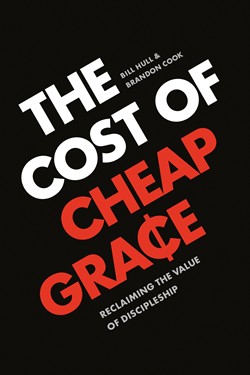We think of salvation as the moment of crossing a threshold, and we let people assume this was the point of it all, that the forgiveness of sins is primarily what the gospel is about, when really, it’s about the party and the host—the coming of God’s Kingdom under the lordship of King Jesus.
By Bill Hull and Brandon Cook, excerpted from The Cost of Cheap Grace
Imagine that you are invited to a party at a beautiful house, with a host and guests you are very excited to spend the evening with. You have heard about this party. Its delights are legendary. So you get all dressed up, dolled up, to the nines. You look “smart,” as the British say. Then you get out of your car and walk across the front walk toward the party, open the front door, and cross over the threshold, where you are met with a barrage of lights and colors. People smiling and dancing. And the food. Dear me, the food. It’s delicious, more the stuff of a banquet than a party. You move deeper into the house, your host moving with you from room to room, inviting you deeper into the festivities. Each room becomes more alive with the glow of the party, and you lose all sense of time in the joy of it all.

Looking back, the next morning, you would certainly say that the moment you crossed the threshold was a beautiful moment. But it was certainly not the point of the party. The point of the party was to celebrate with your host; the point of crossing the threshold was to move deep into the party. Imagine that, after getting to the front door and crossing the threshold, you had decided to stay there, thinking that that was the point of it all. Think of how much you would have missed!
By locking up the full-bodied biblical notion of salvation within a transactional metaphor, this is exactly what the contemporary church has done! We think of salvation as the moment of crossing a threshold, and we let people assume this was the point of it all, that the forgiveness of sins is primarily what the gospel is about, when really, it’s about the party and the host—the coming of God’s Kingdom under the lordship of King Jesus. We miss that the point of crossing the threshold, as wonderful a moment as it is, is not the point of the party. And to miss the true point turns out to be a great tragedy.

Perhaps the reason the contemporary church is increasingly deemed irrelevant is because it has focused on getting people over the threshold and not into the party—the coming of the Kingdom of heaven (cf. Luke 14:15). We must change our imagery of what it’s all about, so that people understand what biblical language was pointing to all the time: salvation as participation with God in what he is doing in us and in the world.
With proper perspective and prophetic metaphors in place, our thinking and our imaginations are freed up. Indeed, when you change your imagery, your story, and your metaphors, everything changes. Grace, in the context of the party, is not just the power to get you over the threshold, though it is and remains that. It’s also power of God filling our lives, taking us deeper into the party, empowering us to live as disciples. And two distinct categories—conversion and discipleship—collapse into one movement. Into one relationship.
 The Cost of Cheap Grace by Bill Hull & Brandon Cook
The Cost of Cheap Grace by Bill Hull & Brandon Cook
What is a Christian? At the most basic level, a Christian is a disciple of Jesus Christ. And yet many Christians today couldn’t tell you what a disciple of Jesus Christ is, or would even think of themselves as disciples. And yet in the Great Commission, Jesus specifically called us to make disciples. Everything else is secondary.
The Cost of Cheap Grace is an extended, sweeping, bold, and bracing call to repentance for where we’ve let secondary things subvert our commitment to discipleship, and a compelling vision for discipleship as the basis of the gospel in all its world-changing, subversive power.
Get your copy of this new release for 20% off now for a limited time only! >>




